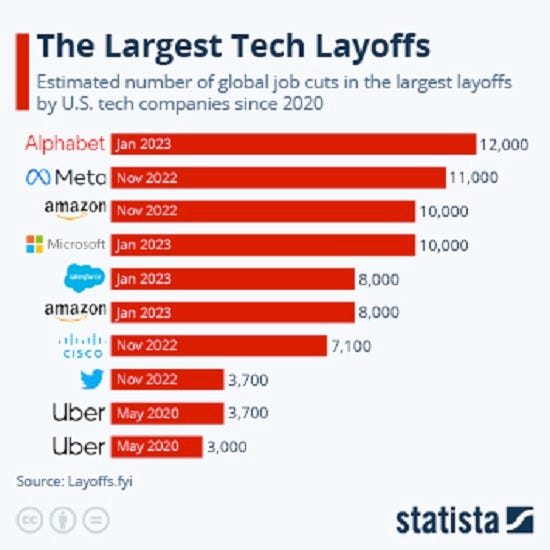Big Bets on AI Follow Big Tech Layoffs
Several Big Tech firms announced layoffs of thousands, followed by plans to expand use of AI, fueling fears of more job loss, however warranted
By John P. Desmond, Editor, AI in Business

Bring on the layoffs, and follow it up with a more comprehensive AI strategy, seemed to be the theme of a number of recent announcements in Big Tech.
The wave seems to have started with Twitter, whose new owner Elon Musk in early November announced the layoff of half the workforce of some 7,500 workers. Speaking at an investor conference, Musk referred to “revenue challenges” as the reason for the layoffs.
Since then, the wave of layoffs has built; in a summary from CNBC:
Google last week announced plans to lay off 12,000 workers;
Microsoft last week announced plans to lay off 10,000 workers;
Amazon was expected to cut 18.000 workers;
Salesforce announced plans to lay off 7,000 workers, 10 percent of its workforce;
Facebook/Meta announced plans to cut 11,000 workers, 11 percent of its workforce;
Most companies said the workforce reductions were a necessary adjustment to a too-rapid expansion during the Covid pandemic, when online business boomed, and also an adjustment to expected slower growth, higher interest rates and fears of a possible recession.
The recent announcements follow a rough 2022, when more than 150,000 tech workers were laid off, according to the tracker Layoffs.fyi.
Bring on the AI
Several companies announced increased plans to incorporate AI, at the same time the workforce reductions were announced.
At the recent World Economic Forum held in Davos, Switzerland, Microsoft CEO Satya Nadella stated, “A golden age of AI is underway and will redefine work as we know it,” according to an account in Fortune.
Microsoft made a good bet a few years ago with its $1 billion investment in OpenAI, the maker of ChatGPT that is currently sweeping the internet, creating a substantial valuation for OpenAI, and putting it in a position to challenge Google’s dominance in the search engine market.
Microsoft intends to build “a new computer platform” based on advances in AI, Nadella stated at Davos. He maintained that workers would become more efficient and productive working with AI. “I see these technologies acting as a co-pilot, helping people do more with less,” Nadella stated.
At the time Google announced its layoffs, CEO Sundar Pichal stated that the company has “a substantial opportunity in front of us with AI across our products and are prepared to approach it boldly and responsibly,” according to the Fortune account.
The simultaneous announcements of layoffs and expanded investments in AI are stoking fears that AI will replace many human jobs.
One expert is cautioning against an overreaction. “Going back 200 years, there have been waves of fears about automation, in which people look at new technologies and get scared that they are going to fully replace human labor,” stated Aaron Benanav, the author of “Automation and the Future of Work” and a professor at Syracuse University, in a recent account in Time magazine. “And so far, all the predictions have been proven wrong,” he stated.
Some prognosticators believe that AI will add more jobs. Last year, the World Economic Forum predicted that AI would replace 85 million jobs by 2025 but create 97 million new ones.
And of course realistically, some jobs will be replaced by automation, aided and abetted by AI. A group of senior-level tech executives on the Forbes Technology Council, quoted in a recent account in Built In, named 15 professions likely to be more highly automated in five to 10 years, including insurance underwriting, warehouse and manufacturing jobs, customer service, research and data entry and long haul trucking.
Kai-Fu Lee, a Taiwanese computer scientist, AI expert and CEO of Sinovation Ventures, wrote in a 2018 essay that 50 percent of all jobs will be automated by AI within 15 years.
“Accountants, factory workers, truckers, paralegals, and radiologists — just to name a few — will be confronted by a disruption akin to that faced by farmers during the Industrial Revolution,” Lee wrote.
Studies from McKinsey, Global Institute, Oxford University and the US Bureau of Labor Statistics, and others, suggest a “massive and unavoidable change afoot,” the Built In account stated. The impact of the continued implementation of AI will be felt by specially trained workers as well as collar workers.
The authors listed jobs AI cannot replace:
Teachers
Lawyers
Social workers
Medical professionals
Therapists
Management professionals
“AI and robots can’t replicate the empathy and social intelligence that these fields require,” the author suggests.
Moreover, the shift to AI as a software development platform will create many new jobs humans will need to staff. “ When you look at AI, there's this nonstop need for training, for data, for maintenance, for taking care of all the exceptions that are happening. How do we monitor AI? How do we train it? How do we make sure that AI's not running amok? Those are all going to become new jobs,” stated Sean Chou, CEO of Catalytic, an AI startup offering a low-code AI development platform. (Ed. Note: Catalytic in March was acquired by PageDuty, offering low-code workflows across a business.)
Anyone seeking to position for the age of AI, is advised by the Built In authors to cultivate skills in these areas:
Basic mathematics
Strong verbal and written communication;
Creativity;
People management;
Emotional intelligence; and
Critical thinking and problem-solving
While not everyone will be a mathematician or a Python programmer, Chris Nicholson, CEO of the San Francisco-based machine learning company Skymind AI, suggests workers cultivate a decent understanding of statistical concepts and algebraic linear regression to help comprehend the “output of AI algorithms.” He sees this foundation of knowledge as being the key to “being able to adapt.”
Read the source articles and information from CNBC, in Fortune and in Built In.
(Write to the editor here.)




